|
| |
|
|
 |
Reprints of Catholic Classics - continued
|
 |
|
|
|
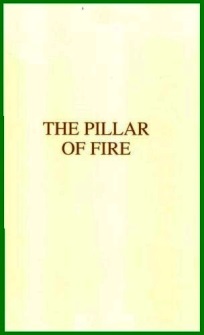
|
The Pillar of Fire
From the Introduction:
I first read The Pillar of Fire shortly after it was first
published, back in the Fifties. I did not see then its true value
in full, perhaps because true values were still in honor at that
time. When browsing in a crummy bookstore in late May of 2000 I
spotted an almost pristine paperback copy, I did not suspect that
I would spend much of the next night reading. I immediately
decided to bring it out in the Real View Books Reprints
series. Through a chance remark of mine I learned that the
association "Remnant of Israel" had already decided on its
republication. In writing this Introduction my sole purpose was
to call attention to points in this book that will keep it a
pillar of fire for those to whom Karl Stern intended it: for Jews
to understand his conversion or rather to understand through it
something supremely important to them; and for Catholics that
they may see beneath fashionable platitudes of Judeo-Christian
phraseology what truly makes Jews their brothers. To Bernard
Nathanson the reading of The Pillar of Fire was like being
touched "by the hand of God." May Karl Stern's classic continue,
through this edition, its God-given mission.
By Karl Stern
•
Introduction by Fr. Stanley L. Jaki
ISBN 978-1-884660-12-2
•
xxviii + 310 pages
•
softcover
•
$18

|
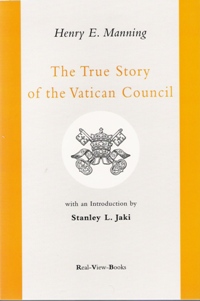 |
The True Story of the Vatican Council
By calling his book the true story of the Vatican Council of 1870, Cardinal Manning (1808-1892) aimed at dissipating a dark cloud of false notions. In its lucid simplicity and factuality his book remains the best concise account of what was debated and defined at Vatican I and of its importance for the Church in the modern world. As Archbishop of Westminster, Manning, one of the foremost converts from Anglicanism, was in the very center of those debates. In fact, without him papal infallibility might not have come up for debate at Vatican I.
By H.E. Manning
•
Introduction by Fr. Stanley L. Jaki
ISBN 0-9641150-6-9
•
xxxii + 206 pages
•
softcover
•
$14

|
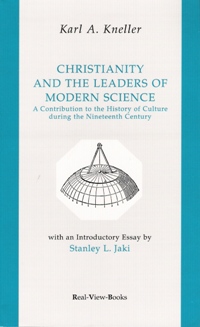 |
Christianity and the Leaders of Modern Science
Father Karl A. Kneller (1857-1942), was a Jesuit Church historian, but one fully alive to the needs of Catholics and Christians in his day, the closing decades of the Nineteenth century. He regaled them with a splendid "contribution to the history of culture in the nineteenth century". Those decades were reverberating with the claim that science had discredited the Christian Creed and that scientists, by and large, had abandoned religious convictions as the final obstacles to a human culture steeped in science. Father Kneller tracked down the record which fully disclosed the falsity of that claim. His book bursts with information, not easily available elsewhere and certainly not in a similarly impressive synthesis.
By K.A. Kneller
•
Introduction by Fr. Stanley L. Jaki
ISBN 0-9641150-4-2
•
xxvii + 403 pages
•
softcover
•
$21

|
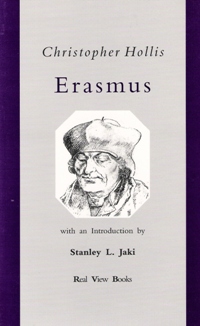 |
Erasmus
Published in 1931,
Christopher Hollis' Erasmus retains a unique distinction. In
this book alone can the general reader encounter the true measure
of Erasmus' chronic insincerity. Especially significant is proper
information on that score at a time when Erasmus' thought is
being promoted as an especially insightful depository of
guidelines for Church reform. To counter this dubious trend
Hollis' Erasmus should prove very effective. Hollis uses the
facts and documents relating to Erasmus' personality, life, and works
as a dossier of indictment against him.
By Christopher Hollis
•
Introduction by Fr. Stanley L. Jaki
ISBN 0-9641150-9-3
•
xxiii + 323 pages
•
softcover
•
$18

|
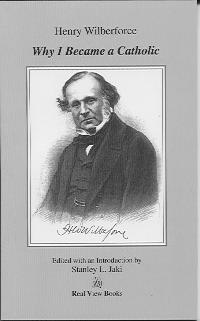 |
Why I Became a Catholic
Henry, an Anglican clergyman, converted to Catholicism in 1850. He was followed into the Church by two brothers of his, Robert Isaac and William. All three owed their
conversion to Newman's influence. The shock produced in England by Henry's conversion was enormous. Then and there the Church of England meant England, almost the entire British Empire. To leave it, and to leave it for Rome, bordered on treason.
On hearing of rumors that he had not been honest with his parishioners while ministering to them, Henry decided to set matters straight. As he explains in this book, he became a Catholic in order to possess in their full logic and without any trace of error all the truths he had held and preached while an Anglican. The book ends on a truly dramatic note.
By Henry Wilberforce
•
Introduction by Fr. Stanley L. Jaki
ISBN 1-892548-17-8
•
v + 70 pages
•
softcover
•
$5

|

|
|Home|
|Biography|
|Science and Religion|
|New Editions|
|Reprint Series|
|Reprint cont|
|About Newman|
|Newman Works|
|Booklets|
|Booklets cont|
|Theology|
|Theology cont|
|Prayers|
|Various|
|Contact Us|
| |